
SUPPORTIVE CARE IN CANCER
Scope & Guideline
Fostering interdisciplinary collaboration in supportive care.
Introduction
Aims and Scopes
- Symptom Management and Palliative Care:
Research addressing the management of symptoms such as pain, fatigue, nausea, and psychological distress in cancer patients, focusing on both pharmacological and non-pharmacological interventions. - Quality of Life Assessments:
Studies that evaluate health-related quality of life (HRQoL) in cancer patients, including the impact of various treatments and supportive care interventions on patients' physical and emotional well-being. - Caregiver Support and Burden:
Research exploring the experiences, needs, and challenges faced by caregivers of cancer patients, highlighting the importance of their well-being and the support systems available to them. - Nutritional Support and Rehabilitation:
Investigation into the role of nutrition and rehabilitation strategies in enhancing recovery and quality of life for cancer patients, particularly during and after treatment. - Psychosocial Interventions:
Studies examining the effectiveness of psychological and social support interventions aimed at improving mental health outcomes for cancer patients and their families. - Integrative and Complementary Therapies:
Research into the use of complementary therapies, such as acupuncture, mindfulness, and exercise, alongside conventional treatments to enhance patient outcomes. - Health Disparities and Accessibility:
Exploration of disparities in cancer care access, treatment, and outcomes among diverse populations, emphasizing the need for equitable supportive care.
Trending and Emerging
- Telehealth and Remote Care:
The increase in publications focusing on telehealth interventions and remote patient monitoring reflects the growing need for accessible cancer care solutions, especially highlighted by the COVID-19 pandemic. - Patient-Reported Outcomes:
There is a significant trend towards utilizing patient-reported outcomes (PROs) in research, emphasizing the importance of capturing patients' perspectives on their symptoms and quality of life. - Multidisciplinary Approaches:
Research advocating for multidisciplinary care models that integrate various health professionals to address the complex needs of cancer patients is gaining traction. - Focus on Mental Health:
An emerging emphasis on mental health interventions, including psychological support and coping strategies, indicates a recognition of the psychological burden of cancer. - Health Equity and Disparities:
Growing attention to health disparities and the need for equitable access to cancer care services reflects an increasing awareness of social determinants of health in cancer outcomes. - Physical Activity and Rehabilitation:
A surge in studies examining the role of exercise and rehabilitation in cancer recovery highlights a trend towards promoting physical activity as a core component of supportive care. - Nutrition and Cancer Survivorship:
Research exploring the impact of nutrition on cancer survivorship and recovery is trending, with a focus on tailored dietary interventions to enhance patient outcomes.
Declining or Waning
- Traditional Pharmacological Interventions:
There seems to be a waning emphasis on traditional pharmacological approaches to symptom management, as newer studies increasingly explore integrative and complementary therapies. - Inpatient Care Models:
Research related to inpatient care settings and management has seen a decline, with more focus shifting towards outpatient and home-based supportive care interventions. - Generic Cancer Care Models:
The journal is moving away from generic models of cancer care towards more personalized and patient-centered approaches, which may reflect ongoing trends in oncology. - Static Quality of Life Measures:
There is less emphasis on static measures of quality of life, with a growing interest in dynamic and longitudinal assessments that capture changes over time. - Single-Center Studies:
The prevalence of single-center studies is declining, with a preference for multicenter and collaborative research efforts that enhance the generalizability of findings.
Similar Journals
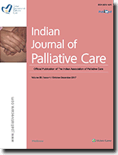
Indian Journal of Palliative Care
Exploring the intersection of palliative care and public health.Indian Journal of Palliative Care is a premier peer-reviewed publication dedicated to advancing the field of palliative care within the broader domains of health policy and public health. Published by SCIENTIFIC SCHOLAR LLC in India since 2003, this Open Access journal is committed to providing a platform for innovative research and practices that promote quality of life for patients with life-limiting illnesses. With a focus on health policy and environmental and occupational health, the journal holds a respected position in the Q3 quartile for both categories, reflecting its significant contributions to scholarly discourse. Ranked #393 in Public Health and #185 in Health Policy according to Scopus, it serves as an essential resource for researchers, professionals, and students seeking to deepen their understanding of palliative care and its implications within public policy and health frameworks. Through its rigorous editorial standards and broad accessibility, the Indian Journal of Palliative Care plays a vital role in shaping effective solutions and policies that aim to enhance patient care and well-being.
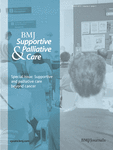
BMJ Supportive & Palliative Care
Fostering collaboration for superior patient-centered care.BMJ Supportive & Palliative Care is a leading academic journal dedicated to advancing the field of supportive and palliative care, published by the esteemed BMJ PUBLISHING GROUP in the United Kingdom. With an ISSN of 2045-435X and an E-ISSN of 2045-4368, this journal showcases high-quality, peer-reviewed articles that cater to a diverse audience, including healthcare professionals, researchers, and students. Notably, it holds a commendable impact factor, reflecting its credibility and influence within the academic community. As of 2023, the journal ranks in the top quartile (Q1) for Medical and Surgical Nursing and holds prestigious positions in the Q2 category for Medicine (miscellaneous) and Oncology (nursing), demonstrating its significance in multiple disciplines. Research published in this journal aims to enhance patient-centered care practices and improve health outcomes, making it an invaluable resource for innovative studies and discussions in the field. With a commitment to open access principles, BMJ Supportive & Palliative Care serves as a pivotal platform for disseminating knowledge and supporting the ongoing professional development of its readership.
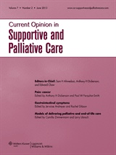
Current Opinion in Supportive and Palliative Care
Transforming perspectives in supportive and palliative practices.Current Opinion in Supportive and Palliative Care, an esteemed journal published by Lippincott Williams & Wilkins, provides a vital platform for the dissemination of contemporary research and expert perspectives in the fields of supportive and palliative care. As part of the medical community's growing focus on critical care and oncology, this journal has earned its place in the Q2 category across multiple rankings, reflecting its influence and significance in advancing knowledge and practices. With its ISSN 1751-4258 and E-ISSN 1751-4266, it covers literature from 2007 to 2024, making it a reliable resource for the latest developments. While it does not offer open access, the journal ensures careful curating of high-quality articles, fostering a deeper understanding of complex care needs. Researchers, clinicians, and students alike will benefit from the journal's insights, exploring innovative strategies and multidisciplinary approaches to improve patient outcomes in critical situations. The commitment to such a crucial area of healthcare underscores the importance of this publication in shaping future practices and policies.
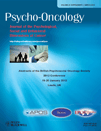
PSYCHO-ONCOLOGY
Exploring Psychological Resilience in Cancer CarePSYCHO-ONCOLOGY is a leading international journal published by Wiley, focusing on the interdisciplinary fields of psychology and oncology. Established in 1992 and continuing its impactful contributions to academic discourse through 2024, the journal occupies a prestigious position with a Q1 ranking in Experimental and Cognitive Psychology and notable placements in both Oncology and Psychiatry and Mental Health categories. With an impressive Scopus ranking that places it in the 86th and 76th percentiles within its respective fields, PSYCHO-ONCOLOGY facilitates the exploration of psychological dimensions of cancer and its treatment, emphasizing evidence-based research that greatly informs clinical practices. Researchers, professionals, and students benefit from its comprehensive scope, which encompasses mental health implications linked to cancer diagnosis, treatment, and survivorship. Although it operates on a subscription model, the journal remains a vital resource for advancing knowledge and promoting psychosocial well-being in oncology, making it an essential read for those dedicated to improving patient outcomes.
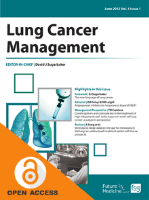
Lung Cancer Management
Leading the Charge in Lung Cancer Research and ManagementLung Cancer Management, published by FUTURE MEDICINE LTD, is a premier academic journal dedicated to the evolving field of oncology and respiratory medicine. With an ISSN of 1758-1966 and an E-ISSN of 1758-1974, this journal offers a platform for the dissemination of cutting-edge research, clinical studies, and expert reviews, all focusing on the latest advances in lung cancer treatment and management. Despite being a relatively new entry since its inception in 2014 and achieving its converged years from 2020 to 2024, it has already established itself in the Q3 quartile for both oncology and pulmonary and respiratory medicine as of 2023, according to category quartiles rankings. With a Scopus ranking of #98 in the category of Pulmonary and Respiratory Medicine and #266 in Oncology, the journal reflects a commitment to quality and relevance in its content. Although it does not offer open access, it remains a crucial resource for researchers, clinicians, and students seeking to stay informed about the latest developments and practical approaches in lung cancer management. The journal is accessible from its base in the United Kingdom, at UNITEC HOUSE, 3RD FLOOR, 2 ALBERT PLACE, FINCHLEY CENTRAL, LONDON N3 1QB, ensuring that it caters to a global audience eager to explore and contribute to this vital field of medicine.

International Journal of Cancer Management
Exploring breakthroughs in oncology and cancer management.The International Journal of Cancer Management is a distinguished publication dedicated to advancing knowledge and research in the fields of cancer management, oncology, pharmacology, and radiology. Published by BRIEFLAND in the Netherlands, this journal serves as a vital resource for researchers, healthcare professionals, and students interested in the latest developments in cancer care and treatment strategies. With an ISSN of 2538-4422 and an E-ISSN of 2538-497X, the journal features a range of peer-reviewed articles that cover diverse aspects of cancer management, reflecting its commitment to high-quality, impactful research. The journal ranks in the Q4 category for Cancer Research and Oncology and Q3 for both Pharmacology and Surgery in 2023, signifying its growing influence in the scientific community. Through its open access format, the International Journal of Cancer Management ensures that critical research findings are accessible to all, promoting collaboration and innovation in the battle against cancer. Researchers looking to share their findings or learn more about current trends will find this journal an invaluable addition to their professional toolkit.

JOURNAL OF PSYCHOSOCIAL ONCOLOGY
Exploring the intersection of psychology and oncology.JOURNAL OF PSYCHOSOCIAL ONCOLOGY, published by Routledge Journals, Taylor & Francis Ltd, serves as a pivotal platform in the interdisciplinary field of psychosocial oncology, providing critical insights into the psychological, social, and emotional aspects impacting cancer patients and their families. With a storied history dating back to 1983 and converging until 2024, this journal holds a prestigious positioning, ranked in the Q2 category for Applied Psychology and Q3 for both Oncology and Psychiatry & Mental Health in 2023, highlighting its integral role in these overlapping fields. Despite not currently offering an open access model, the journal continues to attract a broad spectrum of scholars with its impactful research, evidenced by its Scopus rankings within the 50th to 58th percentile across related categories. Researchers, clinicians, and students alike will find the journal’s focus on the psychosocial dimensions of cancer to be invaluable, as it advances knowledge and practice aimed at improving patient outcomes and well-being in the cancer care continuum.
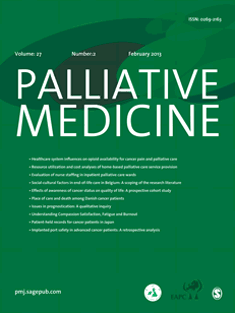
PALLIATIVE MEDICINE
Exploring New Horizons in Pain ManagementPalliative Medicine is a premier journal dedicated to advancing the field of palliative care, published by SAGE Publications Ltd. Established in 1987 and continuing through 2024, this esteemed journal focuses on the integration of pain management and comprehensive care for patients with life-limiting illnesses. With its impressive impact factor and a prestigious Q1 ranking in both Anesthesiology and Pain Medicine, as well as in Medicine (miscellaneous), it stands as a critical resource for researchers, healthcare professionals, and students engaged in this vital area of medicine. The journal emphasizes original research, reviews, and clinical studies that contribute to the understanding and practice of palliative care, promoting improved quality of life and support for patients and their families. Although not open access, articles are accessible through institutional subscriptions, ensuring the dissemination of knowledge to a wide audience. Whether you are a seasoned researcher or an emerging professional in the field, Palliative Medicine remains an invaluable platform for scholarly exchange and innovation.
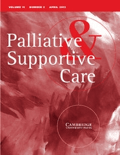
Palliative & Supportive Care
Empowering Professionals in Palliative ExcellencePalliative & Supportive Care, published by Cambridge University Press, is a pivotal journal dedicated to advancing research and practice in the fields of palliative care, supportive care, and the psychological aspects of terminal and chronic illness. With a robust ISSN of 1478-9515 and an E-ISSN of 1478-9523, this esteemed journal has established itself as a vital resource for professionals, researchers, and students who are committed to improving the quality of life for patients facing serious health challenges. Featuring peer-reviewed articles that span clinical psychology, medicine, nursing, and psychiatry, it holds a respectable impact factor, ranking Q2 in Clinical Psychology, Medicine, and Nursing as per the 2023 category quartiles. The journal is based in the United Kingdom and has been contributing to the field since its inception in 2003. Although it currently does not offer Open Access, its rigorously curated content underscores its relevance and importance in facilitating interdisciplinary dialogue and innovation in palliative and supportive care. For those seeking to stay at the forefront of research, Palliative & Supportive Care remains an indispensable platform for scholarly communication and discovery.

Medycyna Paliatywna-Palliative Medicine
Shaping the Future of Palliative Medicine TogetherMedycyna Paliatywna-Palliative Medicine is a vital academic journal dedicated to advancing the field of palliative care, published by TERMEDIA PUBLISHING HOUSE LTD. With its ISSN 2081-0016 and E-ISSN 2081-2833, this journal serves as a reputable source of high-quality research and compelling insights for scholars, healthcare professionals, and students committed to improving the quality of life for patients with serious illnesses. Although it does not currently offer Open Access, Medycyna Paliatywna ensures that articles published within its pages undergo rigorous peer review, reflecting the highest standards in medical research. The journal aims to contribute to the ongoing dialogue in palliative medicine, encouraging innovative practices, sharing evidence-based strategies, and fostering collaboration among healthcare providers. By disseminating important findings and clinical insights, Medycyna Paliatywna plays a crucial role in shaping the future direction of palliative care, making it an essential resource for anyone involved in this critical field.